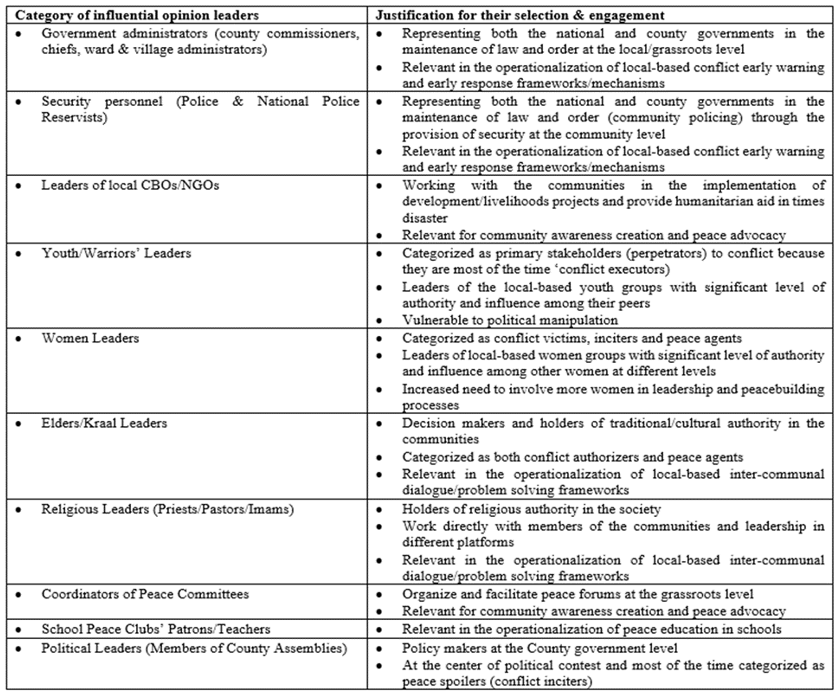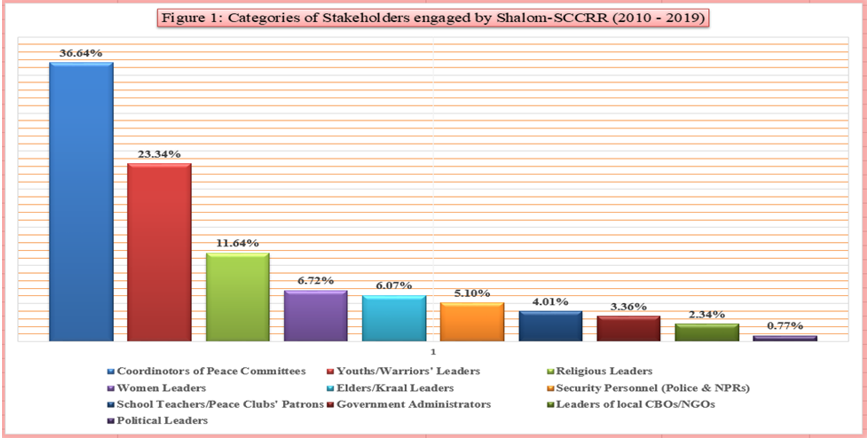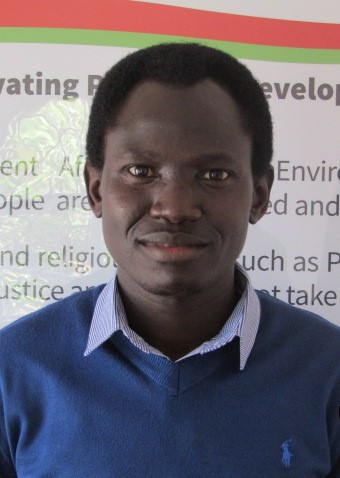(Shalom-SCCRR Department of Research
Director: Prof. W. K. Omoka.
The voice of Peace Practitioners and Researchers)
SHALOM-SCCRR’s APPROACH FOR STAKEHOLDER ENGAGEMENT CONTRIBUTING TO CONFLICT TRANSFORMATION AND PEACEBUILDING PROCESSES IN EASTERN AFRICA REGION.
{© 2020 Shalom-SCCRR}*
By Paulson Erot Tadeo, MA.
(Peer-reviewed by Prof. W. K. Omoka, Rev. Dr. Patrick Devine, and Shalom-SCCRR Dept. of Research)
Introduction
“Shalom distinguishes itself by its unique way of working, incorporating theory through research and practice through training on skills in conflict resolution and transformation. The organisation has a growing reputation for its peace work, professionalism, high research ability, conflict sensitivity and well well structured training modules on analytical skills and knowledge of peace building is a major contributor to our work.” – IGAD’s endorsement of Shalom-SCCRR to the UN, 2018 (https://shalomconflictcenter.org/igad-endorses-shalom-sccrr-for-united-nations-accreditation/)
Since its establishment in 2009, Shalom-SCCRR has been working with vulnerable and marginalized communities that have been affected by cyclical ethnic conflicts in Eastern Africa. The conflict environments in this region are impoverished, underdeveloped and characterised by persistent structural and manifest inter-ethnic violence. With these realities, the organization has committed itself in strengthening the capacities of these communities enabling them to be the architects of their own sustainable peace and development. The organization does this through the utilization of its unique Peace-Humanitarian-Development Methodology whose principal focus is the transformation of the underlying root causes of manifest violent inter-ethnic conflicts, as opposed to merely addressing the symptoms (refer further to https://shalomconflictcenter.org/what-we-do-2/). Rigorous empirical research aimed at identifying the underlying root causes of conflict is the foundation of Shalom-SCCRR’s contextualized and distinctive interventions in conflict environments.
Shalom-SCCRR’s Approach for stakeholder engagement
Shalom-SCCRR acknowledges that targeting relevant, influential and resourceful stakeholders from all levels of leadership in the society is an effective strategic approach in conflict transformation and peacebuilding processes. Over the years, the organization has continued to engage key influential leaders and institutions at the grassroots, middle and top levels of leadership in Eastern Africa. Shalom-SCCRR’s approach for stakeholder engagement has two dimensions/strategies: a.) Working with established Shalom’s Community Peace groups; and, b.) Engaging relevant institutions and organizations through invitations. The engaged stakeholders are further tasked to reach out and mobilize communities and institutions/organizations for conflict intervention processes.
a.) Working with established Shalom’s Community Peace Groups
Shalom-SCCRR has established 28 community peace groups across 11 counties in Kenya and Southern Ethiopia. The categories of key influential opinion leaders engaged by the organization through these groups include government administrators; security personnel; coordinators of peace committees; religious leaders; youth leaders; women leaders; political leaders; kraal leaders; School Peace Clubs’ Patrons/Teachers; and leaders of the local CBOs/NGOs. These leaders were carefully mapped out and purposively selected through rigorous community participation processes based on their leadership roles, influence and resourcefulness in supporting conflict transformation and peacebuilding processes in their communities as stipulated in Table 1 herein. These groups are engaged through series of quality, rigorous and contextualized trainings that are geared towards enhancement of their knowledge, techniques and analytical skills (capacities) in conflict prevention, management, resolution and transformation with the goal of enabling them to effectively contribute in peacebuilding processes in their communities.
Table 1: Categories of key influential opinion leaders working with Shalom-SCCRR in conflict ridden communities in Eastern Africa.

b.) Engaging relevant institutions and organizations through invitations
Shalom-SCCRR is also engaging other resourceful institutions and organizations through official invitations. In this strategy, Shalom-SCCRR has and continue to engage different institutions and organizations – government, religious, non-governmental and academic – in different ways and platforms as discussed herein.
The government institutions (IGAD, Kenya’s national steering committees & county peace directorates) are engaged by the organization in order to influence peace and development policy directions at different levels of governance – county, national and regional. This is done through roundtable discussions and conferences where the organization share its empirical research findings in regards to the dynamics of conflicts in the areas of its operation and practical actions to be taken to address the conflicts. The organization also engages religious institutions(CJPCs, Dioceses & Associated Membership of Episcopal Conferences of Eastern Africa – AMECEA) and Non-governmental organizations/companies (APaD, SAPCONE, PDC & Lake Turkana Wind Power) in order to enhance their capacities in contributing towards peace and development within the communities they work with.
On academic front, the Shalom-SCCRR’s highly qualified and reputable practioners have been invited by numerous institutions and universities to facilitate and deliver lectures and presentations on different topics including ‘Peaceful disarmament’ [Inter-Diocesan Peace Conference in Lodwar, Kenya, 2019]; ‘Conflict Methodologies and Processes’ [University of San Diego, 2019]; ‘On the Ground in Eastern Africa: Creating Peace Amid Conflict and Religious Ideological Extremis’ [DePaul University, Chicago, 2019]; ‘Religious Ideological Extremism,’ [AMECEA at United Nations Conference Center, Addis Ababa – Ethiopia, 2018]; ‘Peace, Security and Sustainable Development in Eastern Africa’ [Queens University, Belfast & Maynooth University, Ireland, 208], ‘Innovative Approaches to Inter-ethnic Conflict Management in Eastern Africa’ [Clinton Peace School in Northern Ireland (2013), Maynooth University (2015), Harvard Law School’s Negotiation and Mediation Clinical Program (2016), University of Texas, Austin and University of Houston, Texas, (2017)] (refer further to https://shalomconflictcenter.org/who-we-are-2019-2020/).
In Tangaza University College, a constituent of Catholic University of Eastern Africa, Nairobi-Kenya, Shalom-SCCRR’s staff led by Dr. Rev. Patrick Devine (Chairman) and Rev. Oliver Noonan, MA (Executive Director) have been offering lectures on: Paradigms of conflict analysis & intervention; Addressing Radicalization and Extremism; Extractive industries and conflict; Women in conflict & peacebuilding; Conflict transformation; Reconciliation; Poverty, Conflict & Development; Governance & State Responsibility; Religion & Conflict; Theory & Practice of Negotiation/Mediation; and, The Just War Theory. Over 300 students from different countries across Africa, Asia, Latin America, and Europe have graduated from these classes. The graduates are currently working for peace, humanitarian and development in a number of faith-based organizations, government and non-governmental institutions in different parts of the world.
Contribution of Shalom-SCCRR’s engaged stakeholders to conflict transformation and peacebuilding processes in conflict environments in Eastern Africa Region.

In the last ten years (2010 – 2019), Shalom-SCCRR has engaged over 17,800 key influential stakeholders that are currently working as frontline agents of peace and development in conflict milieu in Eastern Africa (refer further to https://shalomconflictcenter.org/). These leaders are currently engaging about 84,000 other members of the communities through various peace and development related activities. Some of the key contributions by these stakeholders are discussed herein.
Operationalizing local-based Conflict Early Warning & Early Response (CEW&ER) mechanisms: In most of the conflict zones that Shalom-SCCRR works in, the local-based CEW&ER mechanisms were either lacking or ineffective in curbing looming inter-ethnic conflicts. As a result of this gap, impending conflicts were not able to be addressed early enough resulting to continuous loss of lives, destruction of education and health facilities, loss of livestock, forced migration and disruption of livelihoods among many other negative impacts. In order to address this problem, Shalom-SCCRR worked with the trained leaders in establishing local-based CEW&ER frameworks where none existed and strengthening effectiveness of the existing ones. Through operationalization of these mechanisms, many conflicts have been averted particularly electoral related conflicts across Kenya – before, during and after general elections in 2013, 2017 and even the repeat elections in 2018. Moreover, a number of livestock raids among the pastoralist communities in Northern part of Kenya have been deterred as a result of the utilization of these frameworks. Led by government administrators and security agents, the empowered stakeholders are spearheading continuous conflict monitoring, agreeing on quick impact responses and mobilizing communities for early conflict intervention.
Fostering local-based inter-communal dialogues: The cycle of ethnic violence in conflict areas have contributed immensely to fractured inter-communal relationships. With these realities, the communities have minimal cooperation in addressing inter-communal conflicts. Over the years, Shalom-SCCRR has continued to enhance the effectiveness of local-based inter-communal dialogue frameworks in these areas. The trained stakeholders – led by the elders, religious leaders and coordinators of peace committees – are frequently organizing and facilitating inter-communal dialogues among communities at the grassroots level. So far, a number of conflicts have been managed and resolved through these frameworks; the key ones being livestock raids/theft, competition over grazing fields and water points, land disputes and political instigated conflicts.
Facilitating peace education in schools: Shalom-SCCRR is contributing to the operationalization of Kenya’s peace education program in schools across the country. With the guidance and support from Shalom-SCCRR, the teachers are currently facilitating peace education activities in 37 schools across the country. The teachers are managing, facilitating and overseeing the design and implementation of peace clubs activities in these schools. Operationalization of peace education in these schools is, therefore, contributing to improved interaction and collaboration among children from diverse ethnic communities resulting to nurturing of a culture of peace in schools. The engaged schools are now becoming ‘sanctuaries’ of peace in environment prone to cycle of violence among its inhabitants.
Overseeing Shalom-SCCRR’s education and development projects: So far, Shalom-SCCR has implemented over 490 educational and development projects in more than 260 institutions across Kenya, Ethiopia, South Sudan, and Tanzania (refer further to https://shalomconflictcenter.org/). These projects have led to the improved social-economic and human security infrastructure in the form of educational, health, religious, and other social facilities in conflict environs. The projects have resulted to increased number of children accessing formal education, improved academic performance in the target schools, and increased inter-ethnic and inter-religious schooling in conflict zones. Supporting schools through the provision of sanitary pads and boarding facilities has tremendously improved the number of girls accessing and completing formal education especially in pastoralist communities and informal urban settlements (slums). Due to provision of the highly needed health equipment, water pumps, and tanks, women are now easily accessing quality maternal healthcare and clean water. In general, these projects have contributed to improved inter-communal interaction and relations among the conflicting communities. Led by school head teachers, government administrators, and religious leaders, the engaged stakeholders are supporting and overseeing the design and implementation of Shalom-SCCRR’s educational and development projects across Eastern Africa region.
Organizing and engaging communities through awareness creation forums: The trained leaders are continuously engaging their communities through different platforms. Led by the elders, the youth/warriors and women, the stakeholders are engaging local-based community groups (particularly elders, youth and women groups) through awareness creation forums in order to deliberate and chart the way forward in regards to different issues pertaining to peace and development in their areas. As a result of these engagements, a good number of youth (former conflict perpetrators) and women (former conflict inciters), are currently involved in worthwhile entrepreneurial activities in the form of motorbike (bodaboda) business, local-based table banking initiatives and weaving of baskets/mats. This in one way has contributed to the reduction of inter-communal attacks since a significant number of the conflict executors/frontline ‘soldiers’ (youth) and conflict inciters (women) are now busy and engaged in industrious income generating activities.
Influencing peace and development policy: Shalom-SCCRR has always contributed in influencing policy directions in regards to peace and development at different levels of leadership – government (IGAD, national & county governments), religious (AMECEA), and local-based CBOs/NGOs/FBOs – in Eastern Africa region. The organization does this through sharing of its research findings, conflict analysis briefs, and the verifiable impact of its peacebuilding and development work across the 20 communities it is engaging in the region. The Members of the County Assemblies (MCAs) engaged in Kenya are currently contributing in the drafting of policy proposals that are meant to enhance security, peace, and infrastructural development in their communities. On the other hand, the local-based CBOs/NGOs/FBOs are continuously engaging the governments by advocating for policies that can strengthen peacebuilding and development initiatives in the areas affected by conflicts in the region.
Conclusion and recommendations
Shalom-SCCRR’s approach to stakeholder engagement has continued to contribute positively to conflict transformation and peacebuilding processes in the IGAD region. This can be attested by the number of peacebuilding initiatives being spearheaded by the trained and engaged stakeholders drawn from different levels of leadership in the societal pyramid. As a result of their initiatives through the guidance and support of Shalom-SCCRR, there are numerous peace and development dividends currently being enjoyed by the vulnerable, marginalized and conflict affected ethnic communities as discussed in this paper.
Shalom-SCCRR has utilized this approach over the last 10 years of its existence. The approach is part of the grand Shalom-SCCRR’s unique methodology that has created local-based structures that are inspiring communities on the ground to effectively deal with conflicts in Eastern Africa region. The approach has been meticulously tested and proven throughout all these years, and it has been found to be effective and efficient in contributing to conflict transformation and peacebuilding processes particularly in the communities that have experienced protracted inter-ethnic conflicts. The bedrock of this approach is to map out and engage different stakeholders at all levels of leadership – grassroots, middle and top levels – based on their leadership roles, influence and resourcefulness to your course. The approach is, therefore, recommended to be considered by policy makers, government institutions, religious institutions, academia and non-governmental organizations involved in peace and development programs.
* This document is copyright to Shalom-SCCRR and cannot be reproduced without permission. Quotations from it should be acknowledged to Shalom-SCCRR

By Paulson Erot Tadeo, MA,
Program Manager (Peacebuilding & Development), Northern Kenya Program
Shalom Center for Conflict Resolution and Reconciliation

